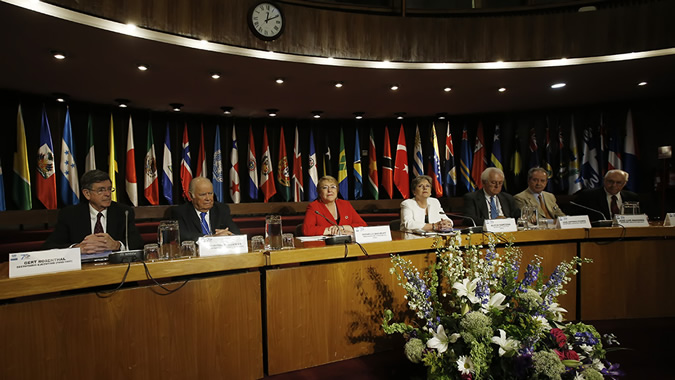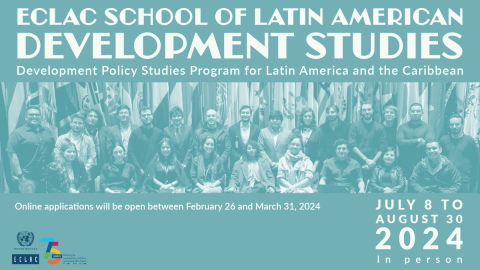Announcement
The United Nations Economic Commission for Latin America and the Caribbean (ECLAC) celebrated its 70th anniversary today with a high-level seminar held in its headquarters in Santiago, Chile, in which it reaffirmed its commitment to continue working for development with equality, environmental sustainability, dignity and well-being for all of the region’s inhabitants.
The event, which kicks off the activities to commemorate the Commission’s 70 years in existence – as of 2018 – brought four former Executive Secretaries of the organization together with the current Executive Secretary, Alicia Bárcena, to reflect on the institution’s history and contributions to Latin American and Caribbean thinking at a roundtable discussion. Chilean President Michelle Bachelet also participated in the event as a special guest.
“This new anniversary gives us the opportunity to revitalize our mission and reaffirm our commitment to the values that underpin our daily work. It allows us to preserve and promote the dignity and well-being of the inhabitants of this vast and diverse region, and advocate for greater equality of rights and opportunities for all women and men,” Alicia Bárcena said during the seminar.
“Now is the time to grow to be more equal, and be more equal to grow. We must break with the culture of privileges, which is manifested in tax evasion and avoidance as well as in illicit capital flows. Equality strengthens democracy and helps in the provision of public goods,” the institution’s top authority added.
Meanwhile, President Michelle Bachelet recognized ECLAC’s contributions, which have made their mark on the history of the region’s economic and social thought over all these years. “Your ideas have been recognized and studied in the most prominent academic centers of the world and your work has made an enormous contribution to public policy administration,” she indicated.
“History has shown us the importance, ongoing relevance and transcendence of ECLAC’s thinking, and of how the integration of economies must be carried out with a view not only to the quantity of insertion, but also its quality,” the Chilean leader added. She also emphasized that in light of the challenges posed by the world today, it is necessary to change the interaction between the State, the market and society, with an “environmental big push to modify the development pattern,” just as the United Nations regional commission has proposed in its latest publications.
The former Executive Secretaries of ECLAC Enrique Iglesias (1972-1985), Gert Rosenthal (1988-1997), José Antonio Ocampo (1998-2003) and José Luis Machinea (2003-2008) spoke at the seminar as well, recalling their respective periods at the helm of the institution. They also exchanged opinions on the evolution of ECLAC’s ideas over the course of these seven decades and on how the organization has contributed to the continent’s economic and social development. In addition, they laid out the challenges that the organization is facing in these new times.
All of them agreed that these challenges translate into promoting the integration of Latin American and Caribbean countries with increasing emphasis, to deal with the uncertainties presented by the current international context, as well as continuing to foster counter-cyclical policies and a productive transformation of economies that allows them to overcome their dependence on raw materials, achieve greater levels of equality, and confront the difficulties entailed by the current evolution of financial markets, globalization and the technological revolution, as well as geopolitical tensions and climate change.
“After 70 years of history, ECLAC today faces the coming decade with a civilizing, universal and indivisible road map, the 2030 Agenda, which puts people’s dignity and equality at the center and therefore requires the broadest possible participation by all stakeholders. We are convinced that equality must be at the center of sustainable development,” Alicia Bárcena stated during her talk.
Along with underlining that ECLAC is not just an academic center, but rather a space for thought at the service of the region, the Executive Secretary indicated that “today, 70 years after it was created and with a forward-looking vision, ECLAC considers that environmental goals and challenges represent a great opportunity for a technological and productive transformation that can be the foundation for generating quality jobs, greater growth and more equality and that provides a big push to economies.”
In his speech, Enrique Iglesias recalled the difficult years during the 1970s that ECLAC’s leadership had to face, above all in its relationship with the host country (Chile), when even the organization’s very existence was threatened. “ECLAC was the first institution created to think about development problems in their comprehensiveness, based on direct knowledge of the realities in the countries that it serves,” Iglesias indicated. “Moving toward the future, ECLAC must prepare itself for a new world dominated by technological transformations, climate change and growing unsatisfied social demands, while also continuing to fight for greater equality, which has been the central theme of this institution throughout its history.”
Meanwhile, Gert Rosenthal stressed the need for the organization to adapt to new times and realities. “ECLAC must ‘accommodate itself’ to these changes and it has the tools to do so: it has internationally recognized quality, the countries it represents feel it is their own institution and value it as such, and the 2030 Agenda offers a framework of reference that allows for doing many things on which ECLAC has accumulated capital for many years,” he indicated. “ECLAC’s future is ensured as long as the United Nations exists in the world.”
José Antonio Ocampo reviewed the importance of the Commission’s contributions in five specific areas: the fiscal compact and macroeconomic management vis-à-vis capital movements; productive development in open economies, which emphasized the relevance of integration and technological development; social development, which placed rights-based social policies as the top priority; the reincorporation of issues related to environmental sustainability in all its main reports; and participation in international debates.
“ECLAC is today the principal research center in the entire UN system. No other organization compares to it, above all in terms of the quality of its analyses,” said Ocampo, who held high-level posts in other international institutions over the course of his professional career.
Finally, José Luis Machinea paid homage to Raúl Prebisch, a renowned Argentine economist who was ECLAC’s main inspiration and its second Executive Secretary (between 1950 and 1963). “He had an extraordinary vocation for development issues. He knew how to maintain his intellectual autonomy, was the first person to defend the application of counter-cyclical policies and constantly sought to have analysis and action interact,” Machinea said.
“Moving toward the future, Latin America and the Caribbean will need integration more than ever and to continue fomenting a productive transformation with equality. The main risk currently is the global uncertainty in which we live: there are threats of a new financial crisis which, on top of protectionist trends and xenophobia, could have grave consequences. In the region we must save during the good years and insist on counter-cyclical policies that allow us to better confront future difficulties,” he added.
The commemoration of ECLAC’s 70 years in existence will continue throughout 2018 with different events to be held both in Santiago as well as at the institution’s other headquarters.



